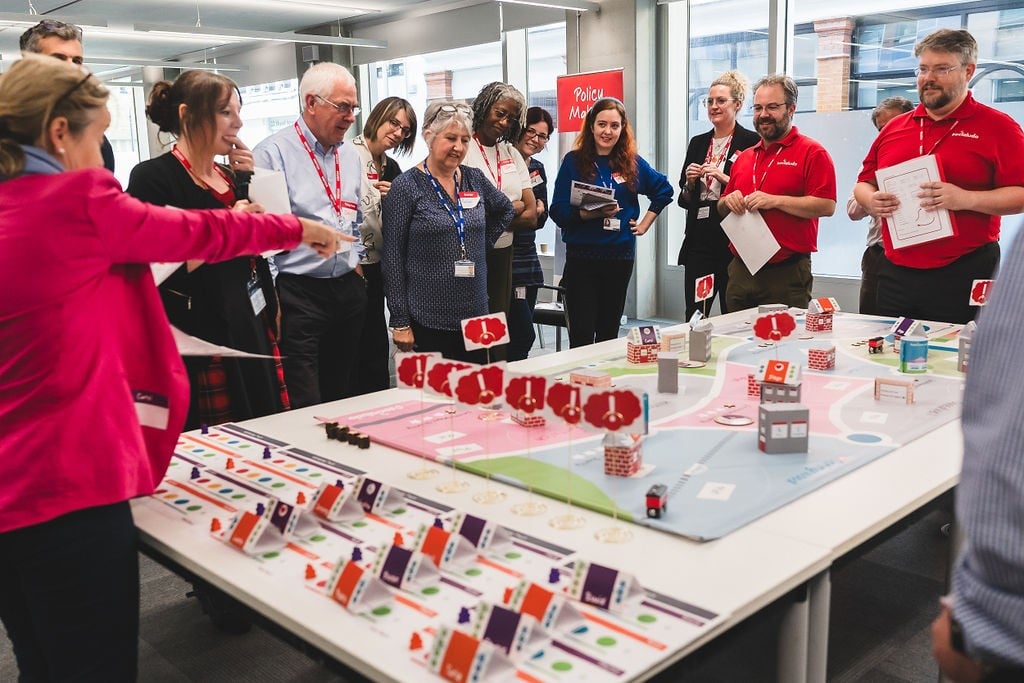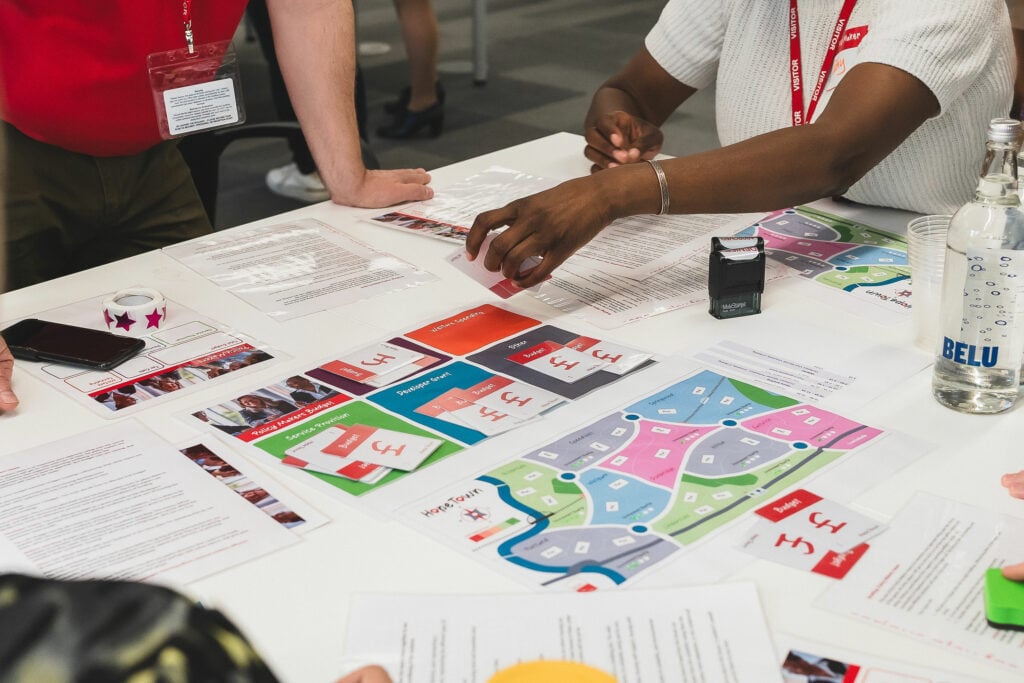Recorded Monday 29 April.
We presented this report and our evaluation as part of our webinar, presenting two interconnected resources aimed at supporting local areas to develop their strategy and business case for housing for older adults.
Introduction
This report presents the findings from a pilot study of a ‘Serious Game’ called Hopetown, an innovative tool for developing local housing partnerships. We set out why local housing partnerships are an essential first step in developing strategic local plans for older people’s housing. The pilot study was conducted in Southwark, London, in early October 2023 over a two-day period with a group of key stakeholders in the local authority and local organisations including health, housing, social care and community groups.
We present an evaluation of this pilot study, outlining the game activities and play as well as the priorities, learning and next steps in relation to housing for older people within Southwark.
Game play
Within the ‘Serious Game’, people are able to face the repercussions of decisions and priorities to help explore the complexities of planning for the future. Players take on roles such as policy makers, developers, service providers and the community, often different to the one they usually do day-to-day (eg, policy makers cannot play as policy makers in the game) to encourage a paradigm shift in thinking while working together to increase the wellbeing of residents in ‘Hopetown’.
Observations made during the day and initial reflections from players included insights and learning around:
The importance of understanding the diversity of the local older population. It was noted that wealthier residents wielded greater ‘market power’ to directly engage developers and shape immediate decisions.
Effective communication – talking to the right groups at the right time was a recurrent challenge, with the community team (the residents) sometimes being left out of key decisions.
Collaboration and co-production – when everyone worked together well, it demonstrated how powerful talking openly and including everyone can be. Getting all the people involved in one place made it easier to make better informed decisions about the current and future plans for housing for older adults.


Setting priorities
Two days after the game a workshop was held at Appleby Blue almshouse, which included residents and provided an opportunity for participants to prioritise next steps for Southwark.
Highest level priorities for a housing plan:
- To co-produce a housing plan that meets the accommodation needs of a diverse community.
- Supporting people with dementia and chronic conditions with proactive dementia support and aids, adaptations and retrofits.
- Investment in different types of housing with the development of a range of housing models and budget options in Southwark. Prioritising accessible housing with aids and adaptations.
- A needs-based and person-centred approach for rehousing older adults within their communities and neighbourhoods.
- Becoming proactive and preventative in approach as opposed to reactionary in responding to crises.
Suggested mechanisms for an improved housing plan:
- Inclusive language around housing, care and support and the needs of older adults.
- Multi-agency planning highlighted the imperative for adaptive, participatory approaches to housing planning.
- Aiming to foster equitable, person-centred and community-centred solutions.
Impact and next steps
As with any local area, Southwark already had or was working on a number of plans and strategies that related to housing for older people both within the local authority and also across other local stakeholders. Hopetown increased understanding across groups of these relevant activities. Following Hopetown some organisations experienced a shift in stakeholder engagement, fostering new collaborations, softening relationships, and catalysing proactive planning efforts. The process of developing an older people’s housing strategy was already in the pipeline and is moving forward in 2024 in Southwark. Hopetown has supported the widening of the stakeholders who could be involved in this strategic thinking and supported Southwark in some initial, wider thinking ready to start that plan.
Hopetown supports learning and action in relation to:
- Strategic thinking: Hopetown provided the time and headspace to think about ageing in place, which can be difficult amidst daily pressures. Recognising the importance of making time for strategic planning with the right people.
- Perspective taking: The experience of taking on different job roles in the game, led to better understanding of other stakeholders as well as how perspective making supports communication, negotiation and decision making.
- Motivation to collaborate with more stakeholders: The game reminded participants about the importance of networking and building connections within and outside the local authority, something reflected in activities and conversations between organisations since the game.
- Enabling choice and control: Participants highlighted the importance of enabling older people to have choice and control. They emphasised the need for meaningful co-production and early community involvement in decision-making.
Conclusion
The pilot demonstrated that Hopetown can help to bring together and support the development of a local housing partnership. Initial impact indicates that it can help strengthen and build relationships between organisations. Hopetown provides an engaging and imaginative method of bringing people together, breaking down silos and enabling headspace for strategic thinking.
- This pilot evaluation is funded by the Dunhill Medical Trust
- The ‘Serious Game’ of Hopetown is delivered by Professor Vikki McCall and Professor Alasdair Rutherford from Socialudo.
- This project was undertaken in partnership with United St Saviour’s Charity and the Housing Learning and Improvement Network (LIN).
If you are interested in playing or hearing more about Hopetown and other serious games please contact Professor Vikki McCall, Creative Director and co-founder of Socialudo on vikki@socialudo.org.
You can find more detailed information about Socialudo on this website that outlines the use of the innovative serious game methodology. If you would like to learn more about serious games, please watch this video.
